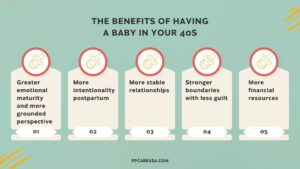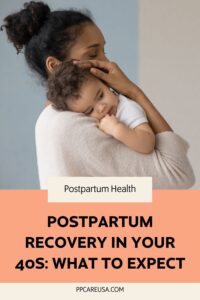After having the unique experience of being pregnant, breastfeeding, and birthing children in my 20s, 30s, and 40s, I can confidently say that postpartum care, recovery, and fitness in your 40s come with both unique challenges and surprising advantages.
With seven children born across three decades, I’ve seen firsthand how motherhood evolves. Here’s a breakdown of why, after all that experience, I believe having a baby in your mature years can be both more challenging—and, in some ways, easier—than doing it at a younger age. Let’s get into it!
Challenges of Postpartum in Your 40s
One of the first challenges of having a baby in your 40s is that healing from childbirth — whether vaginal or via C-section — may take longer. This is often due to decreased collagen production and slower cell regeneration as we age. When I birthed our seventh child in 2023, a precious baby boy we named Roman, I was 41. I noticed that the “bounce back” looked more like a slow roll compared to my recoveries in my 20s and even 30s.
I was sore longer, my ligaments were more sensitive to quick movements, and my overall physical recovery felt slower. As we age, hormonal fluctuations — especially in estrogen and progesterone — make growing and maintaining muscle mass more difficult, which adds to the challenge of regaining strength and energy postpartum.
If you’re having a baby in your 40s or considering it, plan on requiring extra support so you can give your body the time and resources it needs to heal.
Although I didn’t experience any age-related complications during pregnancy, numerous systematic reviews and meta-analyses published in the International Journal of Gynecology & Obstetrics confirm that women over 40 have higher rates of pregnancy-related complications like gestational diabetes, hypertension, and cesarean deliveries — all of which can lengthen recovery.
Then there’s sleep. Sleep deprivation is a challenge at any age, but older bodies may be less resilient to the all-nighters that come with a newborn. Remember in your 20s when you could stay out all night and still show up to work with the club stamp still wet on your hand? I do too—but those days are long gone, and midnight crib parties with a screaming baby hit differently at 41.
Being in your 40s also means more life has been lived, which is beautiful and a gift, but it can bring preexisting conditions like thyroid issues, high blood pressure, or autoimmune disorders that further complicate recovery.
And finally, because fertility naturally declines with age, you may have used assisted reproductive technologies. Hormonal treatments and fertility procedures can leave lingering effects that add complexity to the postpartum period.
The Upside: Why Postpartum Can Be Easier in Your 40s
If all that sounds like reproductive doom and gloom, take heart—because there are some truly beautiful upsides to having a baby in midlife.

First, many women in their 40s have greater emotional maturity and a more grounded perspective on life than they did in their 20s or 30s. Personally, I’ve become more patient with every child, not less. That inner calm and confidence is a huge asset when managing postpartum stress, identity shifts, or growing your family—especially if this baby is the caboose.
Older parents often have more stable relationships, deeper friendships, stronger community ties, and more financial resources—all of which make the recovery process easier and less isolating.
After birthing and breastfeeding six other children, I was surprised when baby Roman couldn’t latch well enough to be nourished in his first 12 hours outside the womb. But thanks to my experience, I knew something was off. And thanks to our financial stability, I had the freedom to act quickly.
We pursued chiropractic bodywork, had a posterior tongue-tie released at 8 days old, visited a lactation consultant five times, did two months of occupational therapy, pumped, syringe-fed, bottle-fed, and breastfed. Baby Roman finally got the hang of exclusive breastfeeding—at 10 months old! We’re still happily nursing at 22 months, but a younger, less experienced me with fewer resources might’ve thrown in the burp rag months earlier.
As an important aside: none of this therapy was covered by insurance. The total cost ran into the thousands! Dollars I’m deeply grateful our older, more stable selves had access to.
Women in their 40s may recover more slowly, but they often approach postpartum with more intentionality. Many are more likely to prioritize rest, nutrition, pelvic floor rehab, and mental health over the toxic “bounce back” culture so common in younger motherhood. After the birth of my first baby at 25 years old I was in the gym working out at just 7 days post birth! Pelvic floor rehab can start nearly immediately, but that’s not what I was doing. Save the bench presses for another day—months down the road and opt for gentle stretching, walking if your birth allows it and quiet moments of gentle swaying and rocking of your newborn.
Another bonus? Older mothers often have stronger boundaries. They’re more willing to say “no” to guilt, pressure, or unnecessary obligations, protecting their energy and peace during those fragile early weeks.
Lastly, if a couple has delayed parenthood into their 40s by choice, that child is often deeply desired—the result of patience, planning, and sometimes heartbreak. That sense of gratitude and longed-for joy can be a powerful psychological buffer during the hard moments of postpartum life.
Some Final Encouragement for You
Having a baby at any age brings its own set of challenges—sleep deprivation, shifting identity, emotional overload, relationship strain, and mom guilt. But knowing that recovery in your 40s may take more effort can actually work in your favor. It can lead to more proactive engagement with fitness, therapy, and postnatal care—and ultimately, a more empowered and fulfilling recovery.
So go ahead. If that final baby is on your mind—even while your friends are throwing graduation parties—and you’re healthy, start putting a plan in motion.
If you don’t already have a solid whole-foods nutrition plan, now is a great time to learn about macronutrients and the specific nutrients your body needs to support implantation. Pregnancy is physically demanding, and labor is a marathon—so get into a fitness routine that builds muscle and endurance.
Those late-night pints of double chocolate fudge ice cream will feel far more deserved after a workout session—and will soon be traded for even sweeter late-night snuggle sessions with your fresh newborn.
Not quite as chocolatey. But oh, so much sweeter.
Sources:
Pin This for Later:



 My name is Tiffany Wickes—a mom to 7 kids aged 1-17 years old, homeschooler for the last 14 years, writer, podcast host and fitness and nutrition coach. The loves of my life are Jesus, my husband Adam, our 7 crazy kids, dark chocolate, peanut butter and fresh flowers. In that order.
My name is Tiffany Wickes—a mom to 7 kids aged 1-17 years old, homeschooler for the last 14 years, writer, podcast host and fitness and nutrition coach. The loves of my life are Jesus, my husband Adam, our 7 crazy kids, dark chocolate, peanut butter and fresh flowers. In that order.
For more information, visit Tiffany’s website: https://www.tiffanywickes.com/
Postnatal Depletion
Meet the Team
Our Services
Supplements
A virtual healthcare clinic that helps postpartum mamas recover from postnatal depletion syndrome with a holistic approach.

Get in touch